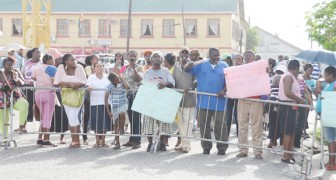The Alliance for Change (AFC) yesterday recommended that a socio-economic developmental plan be crafted for Linden, even as government maintains that residents there must pay more for electricity from July 1.
AFC executive member, David Patterson lamented the condition of town, calling it an “astronomically” impoverished community.
“It is time for a Region Ten Development Strategy to be worked out with the people of the region and all key stakeholders including the donor community, to address in a comprehensive manner, job creation, poverty eradication and the social ills that affect the region,” Patterson said.

Reading from a prepared statement, he reiterated his party’s stance that Region Ten needs a comprehensive development strategy.
He cited statistics which state that of Linden’s over 10,000 population only 375 persons have permanent jobs while an astounding 85% live in poverty and households average a mere $25,000 income monthly. “The government must consider the ability of the residents of Linden to pay for electricity… While it is fair to ask people to pay for that which they consume they can only do so if they afford it,” he added.
It is because of the high poverty level persons have resorted to stealing power much to their own detriment since often there are reports of electrocutions and house fires. “The picture is that of our people caught up in a vicious cycle of destruction which they do not deserve or for which they are not responsible,” said Patterson.
“The AFC recognizes that we need to implement short, medium and long range plans which will create conditions for attracting investors in depressed areas such as Linden. This in turn will create jobs and ensure that people have the purchasing power to purchase all of their necessities, electricity included,” he said.
The Region 10 administration has insisted that residents there are willing but unable to pay more for electricity because of joblessness and poor investment in Linden. The region wants government to provide adequate funding and less burdensome rules to facilitate entrepreneurship especially in the wood sector, information technology and agriculture.
Prime Minister Samuel Hinds has said that progress is being made in several of those areas. He said the time has come for Lindeners to find the means necessary to conserve, if not, pay more electricity.
A small group of Lindeners has been protesting in Georgetown, saying that bauxite pensioners cannot afford to pay for electricity after burning 50 KWh and they want the free amount to remain 300 KWh.
A government notice says residents, other than bauxite pensioners, on the left bank of the Demerara River would pay at a rate of $7 per KWh and the right bank $5 per KWh for the first 50 KWh. If they burn more than that amount, they would have to pay at a rate of $50 per KWh. Commercial and industrial consumers on the left bank of the river would pay at a rate of $15per KWh and those on the right bank $12 per KWh for the first 50 KWh. Should they exceed 50 KWh, the rate would be 65 KWh.
Government said the average cost-recovery price to consumers in Linden would be about $75 to $80, taking into account the 24 percent losses and distribution and commercial costs. At the current price of diesel, the cost of generation alone would be between $59 and $62 per KWh.
The 2012 National Budget provides for a $ 2.865 billion subsidy instead of the $2.7 billion last year.
Referring to NICIL and government’s objection and bemoaning of budget cuts from the state-run National Communications Network, which has been said to have “massive financial irregularities” Patterson opined that some of NICIL’s funds can be used to set up cottage industries in Linden.
The AFC said it will continue to press for Linden’s betterment as in the past “successive governments have failed the people of Linden”.





